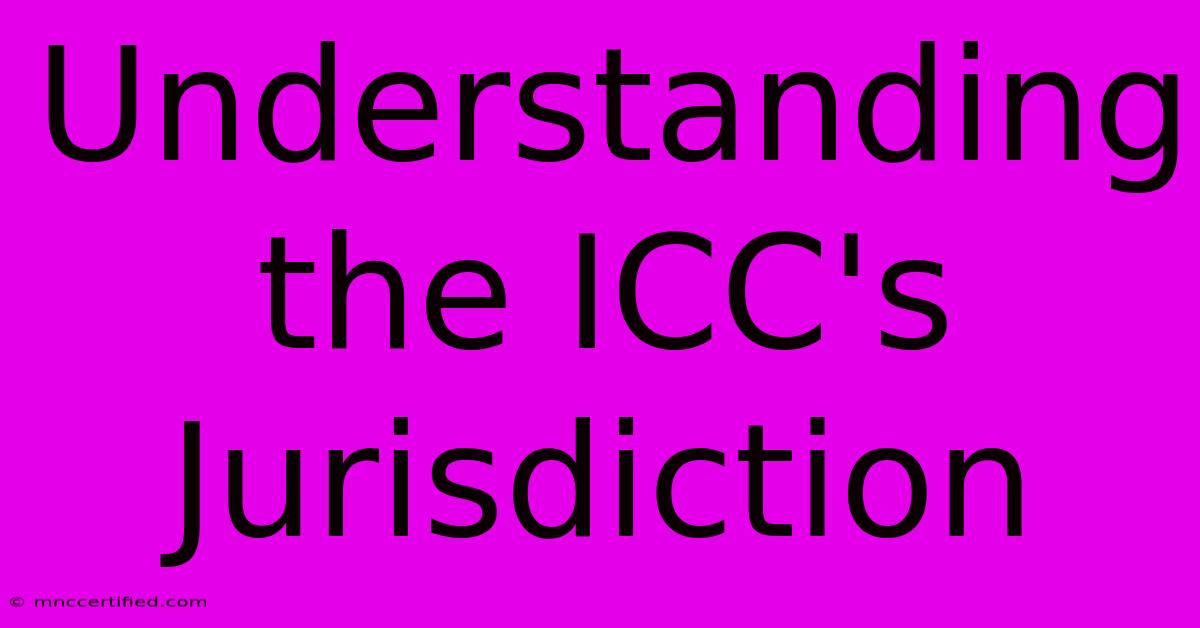Understanding The ICC's Jurisdiction

Table of Contents
Understanding the ICC's Jurisdiction: A Comprehensive Guide
The International Criminal Court (ICC) stands as a landmark institution in international law, striving to hold individuals accountable for the gravest crimes of concern to the international community. However, understanding the ICC's jurisdiction can be complex. This article will break down the key aspects, clarifying who, what, and when the ICC can prosecute.
The Pillars of ICC Jurisdiction: A Tripartite Framework
The ICC's jurisdiction rests on three crucial pillars:
1. Territorial Jurisdiction: Where Crimes Occur
The ICC's jurisdiction extends to crimes committed within the territory of a State Party to the Rome Statute – the treaty establishing the Court. This means a crime committed in a country that has ratified the Rome Statute falls under the ICC's purview, regardless of the nationality of the perpetrator or victim. Crucially, a state's ratification is a voluntary act, and many countries haven't signed up. This limitation is a significant aspect of understanding the Court's reach.
2. Nationality Jurisdiction: The Perpetrator's Citizenship
The ICC also has jurisdiction over crimes committed by nationals of a State Party, even if the crime occurred outside the territory of a State Party. This principle ensures accountability even if the crime takes place in a non-member state, provided the perpetrator is a citizen of a signatory nation. This aspect of jurisdiction is particularly relevant in situations involving transnational crimes.
3. Referral Jurisdiction: State Referral and Security Council Referrals
The ICC's jurisdiction can also be triggered by a referral from a State Party or by a referral from the United Nations Security Council (UNSC). A State Party can voluntarily refer a situation to the ICC, granting the Court jurisdiction to investigate and prosecute crimes committed within its territory or by its nationals. The UNSC, under Chapter VII of the UN Charter, can refer situations to the ICC, even if the State involved is not a party to the Rome Statute. This is a powerful mechanism, allowing the ICC to address situations of widespread international concern.
Types of Crimes under ICC Jurisdiction: The Core Crimes
The ICC prosecutes four core international crimes:
- Genocide: The intent to destroy, in whole or in part, a national, ethnical, racial, or religious group.
- Crimes against Humanity: Widespread or systematic attacks against a civilian population, including murder, extermination, enslavement, deportation, imprisonment, torture, rape, persecution, and other inhumane acts.
- War Crimes: Grave breaches of the Geneva Conventions and other serious violations of the laws and customs of war.
- The Crime of Aggression: Planning, preparation, initiation, or execution of an act of aggression, which is defined as the use of armed force by a State against the sovereignty, territorial integrity or political independence of another State. This is the most recently added crime and its definition and application are still evolving, leading to ongoing debates within the international community.
Limitations and Challenges to ICC Jurisdiction: Gaps and Criticisms
While the ICC represents a significant step towards international justice, its jurisdiction faces several limitations:
- Complementarity: The ICC's jurisdiction is complementary, not exclusive. It only intervenes when national courts are unwilling or unable genuinely to investigate or prosecute. This principle aims to avoid interfering with national judicial systems.
- State Non-Cooperation: Some States actively resist cooperation with the ICC, hindering investigations and prosecutions. This can range from refusing to surrender suspects to withholding evidence.
- Selectivity Concerns: Criticisms have been raised regarding the ICC's apparent selectivity in targeting certain individuals and regions while others escape scrutiny. This raises questions of fairness and impartiality.
- Geopolitical Factors: The ICC's decisions and actions are often influenced by geopolitical dynamics, making it vulnerable to political pressures and criticisms.
Conclusion: The Ongoing Evolution of ICC Jurisdiction
The ICC's jurisdiction is a complex and constantly evolving area of international law. While it has achieved some notable successes in holding individuals accountable for serious international crimes, significant challenges remain. Understanding its limitations and ongoing debates is crucial for a complete comprehension of its role in the pursuit of international justice. Further research into specific cases and ongoing legal developments will provide a deeper understanding of the practical application of this vital institution.

Thank you for visiting our website wich cover about Understanding The ICC's Jurisdiction. We hope the information provided has been useful to you. Feel free to contact us if you have any questions or need further assistance. See you next time and dont miss to bookmark.
Featured Posts
-
Maura Higgins On I M A Celeb Potty Mouth Warning
Nov 22, 2024
-
Ethos Gap Insurance Phone Number
Nov 22, 2024
-
Chris Sale First Cy Young Win
Nov 22, 2024
-
Pamela Hayden Retires From Simpsons
Nov 22, 2024
-
Dic Celebrates 20 Years In Middle East
Nov 22, 2024